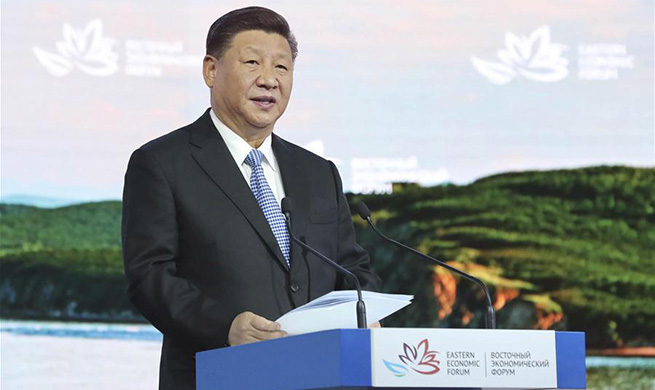SAN FRANCISCO, Sept. 13 (Xinhua) -- Thanks to bottom-up efforts from cities, states and businesses to reduce carbon emissions, the United States is almost halfway to meeting its original 2025 Paris Agreement goal without federal policy support, according to a newly released report.
The report, "Fulfilling America's Pledge," released at the ongoing Global Climate Action Summit held in San Francisco, was presented by summit co-chairs California Governor Jerry Brown and United Nations Secretary-General's Special Envoy for Climate Action Michael Bloomberg on Thursday.
Using a purpose-built integrated assessment model incorporating thousands of aggregated data points from across diverse non-federal actors, the report finds that current commitments and market forces will cut economy-wide emissions 17 percent below 2005 levels by 2025, roughly two-thirds of the way to America's pledge under the Paris Agreement, which called for reductions of 26 to 28 percent over that period.
"While headlines focus on the political fights in Washington, the real action on climate change is happening in cities, states, and the private sector," said Bloomberg.
He added that the country needs more leadership from the federal government, "but until we get it, this report can serve as a blueprint for national climate action, driven from the bottom up."
The report, prepared by researchers at the University of Maryland and the Rocky Mountain Institute, an independent think tank, analyzed 10 high-impact climate action strategies across most major economic sectors and all greenhouse gases, including electricity, transportation, buildings, oil and gas methane, natural and working lands, and hydrofluorocarbons.
It identifies the most plausible pathways for accelerated implementation of climate commitments by cities, states and businesses, all within realistic legal and political constraints and without federal policy support.
Such pathways include: setting and implementing more stringent renewable energy procurement policies, accelerating the phase-out of super-polluting refrigerant gases, and mapping and repairing methane leaks from natural gas pipelines.
"States, cities, businesses, universities and non-profits are showing the way with real commitment and real action on climate," said Brown.
"We're getting it done, but there's still a mountain to climb," he added.
Created in response to President Donald Trump's decision last year to withdraw from the Paris Agreement, America's Pledge and the affiliated "We Are Still In" network capture the thousands of different U.S. city, state, and business actions that together can help to fulfill the country's commitment under the Paris Agreement.
Since its inception, the America's Pledge initiative has released two reports to the United Nations detailing the progress non-federal actors are making toward the United States' Nationally Determined Contribution and plans to continue serving as the reporting entity to the United Nations in the absence of federal climate leadership.













